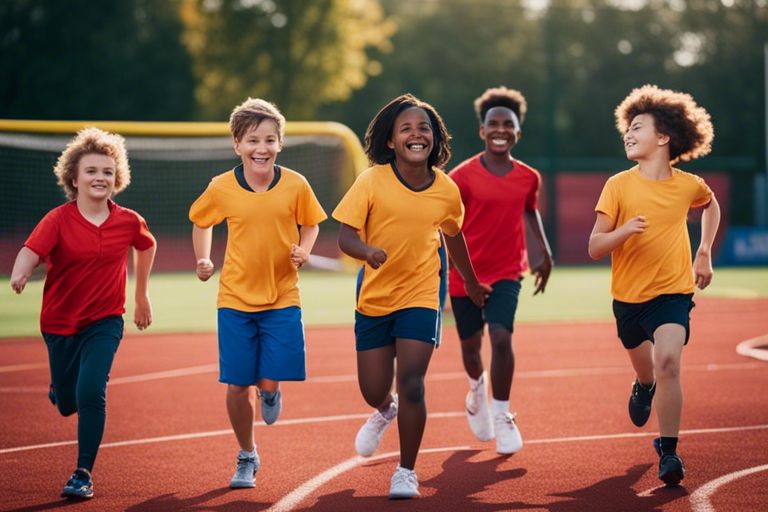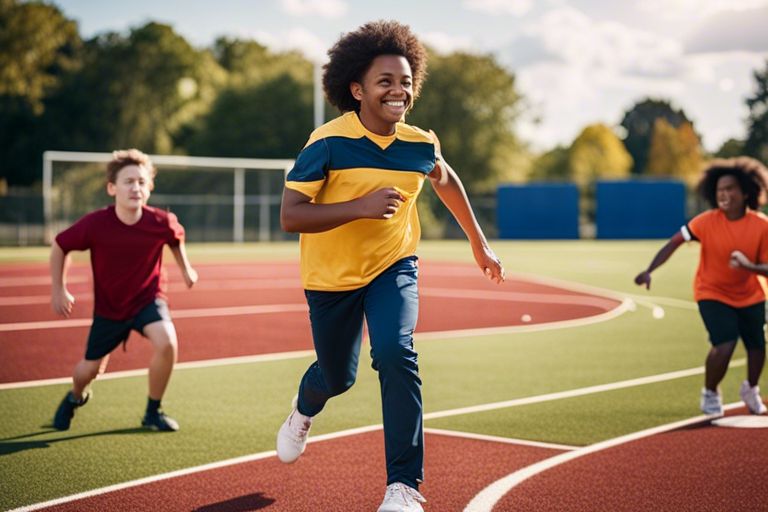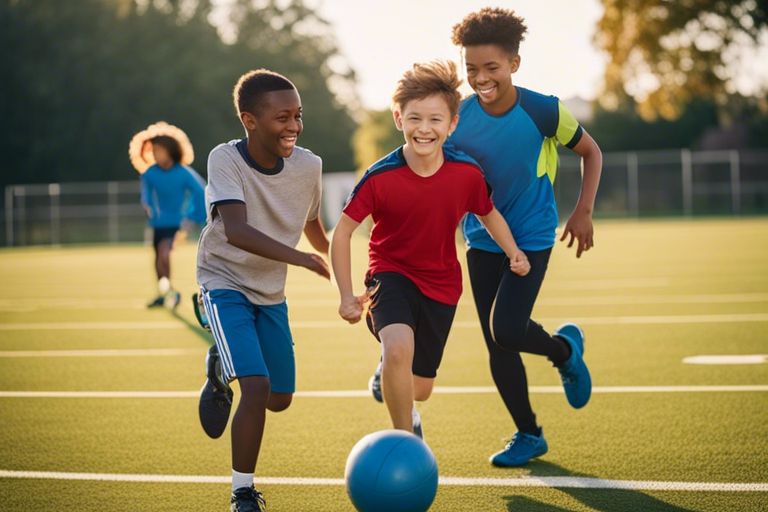Autism, a complex neurodevelopmental condition, affects how individuals communicate, interact with others, and experience the world. When it comes to sports, inclusivity and participation are key to ensuring that individuals on the autism spectrum have the opportunity to experience the many benefits that sports can offer. Sports not only promote physical fitness and skill development, but also provide a platform for individuals to build confidence, social skills, and a sense of belonging.
It is crucial for sports organisations, clubs, and coaches to be aware and educated about autism to create inclusive environments where individuals of all abilities can thrive. With the right support and understanding, individuals with autism can fully engage in sports, breaking down barriers and fostering a culture of acceptance and empowerment.
Key Takeaways:
- Awareness: Increasing awareness about autism in sports can help promote inclusivity and participation.
- Adaptations: Implementing adaptations in sports activities can provide opportunities for individuals with autism to engage and excel.
- Social Benefits: Participation in sports can offer social benefits such as improved communication skills and building relationships for individuals with autism.
Challenges in Sports Participation for Individuals with Autism
Sensory and Social Barriers
Individuals with autism may face sensory and social barriers when it comes to participating in sports. The sensory overload from bright lights, loud noises, and unfamiliar environments can be overwhelming for them. Additionally, challenges in social communication and interaction can make it difficult for autistic individuals to engage with teammates and coaches effectively.
It is crucial to create inclusive and supportive environments in sports settings to help autistic individuals overcome these barriers. By providing supportive structures and understanding, we can help make sports more accessible for children with autism.
Lack of Tailored Programs and Support
Lack of tailored programs and support specifically designed for individuals with autism can be a significant challenge in sports participation. Without specialised coaching and accommodations, autistic individuals may find it hard to fully engage and benefit from sports activities.
It is essential to develop tailored programmes that cater to the unique needs of autistic individuals in sports. Providing appropriate support, training, and resources can make a positive impact on their participation and enjoyment of sporting activities.
Further research and investment are needed to create more tailored programmes and support services for individuals with autism in sports. By addressing these challenges, we can promote inclusivity and participation for autistic individuals in the sports community.
Benefits of Sports for Autistic Individuals
Physical Health Improvements
Sports offer a range of physical health benefits for autistic individuals. Regular participation in sports activities helps improve cardiovascular health, muscular strength, coordination, and overall physical fitness. Engaging in sports also promotes better motor skills development and enhances the body’s agility and flexibility. These improvements contribute to better overall health and well-being for autistic individuals.
Moreover, participating in sports can help autistic individuals maintain a healthy weight and reduce the risk of obesity, which is common among individuals with autism. The physical exertion involved in sports activities also helps in releasing endorphins, which can improve mood, reduce anxiety, and promote better sleep patterns.
Social Skills and Self-Esteem Enhancement
Aside from the physical benefits, sports also provide a platform for enhancing social skills and building self-esteem among autistic individuals. Through team sports or group activities, individuals with autism can develop communication skills, teamwork, and cooperation. These interactions help them in forming relationships, understanding social cues, and fostering a sense of belonging within a supportive community.
Engaging in sports activities also boosts self-confidence and self-esteem in autistic individuals. Achieving personal goals, mastering new skills, and receiving recognition for their efforts contribute to a positive self-image. Furthermore, the sense of accomplishment gained from participating in sports can lead to increased confidence in other areas of their lives.
Social Skills and Self-Esteem Enhancement: In addition to teamwork and communication skills, sports also provide opportunities for autistic individuals to learn about sportsmanship, fair play, and dealing with both success and failure. These experiences help in honing their emotional regulation and resilience, which are essential life skills.

Strategies for Promoting Inclusive Sports
Adapting Sports Environments
Creating inclusive sports environments is crucial in promoting participation among individuals with autism. This can involve making simple adjustments such as providing clear signage, designated quiet areas, and sensory-friendly equipment. Furthermore, ensuring that the facilities are wheelchair accessible, have adequate lighting, and are free from any potential hazards can significantly enhance the experience for participants with autism.
Additionally, organising structured routines and visual schedules can help individuals with autism navigate sports environments more effectively. This can reduce anxiety and enhance their overall experience, leading to increased inclusivity and participation.
Training for Coaches and Staff
Proper training for coaches and staff is essential in ensuring that individuals with autism are supported effectively in sports settings. Coaches and staff should receive training on autism awareness, communication strategies, and behaviour management techniques. By equipping them with the knowledge and skills to understand and accommodate the needs of individuals with autism, the quality of support provided can be greatly enhanced.
Furthermore, incorporating strategies for creating inclusive environments within the training programmes for coaches and staff can further promote inclusivity and engagement among individuals with autism. This investment in training can lead to more meaningful and empowering sports experiences for individuals on the autism spectrum.

Successful Initiatives and Programs
Local Community Efforts
In communities around the world, there has been a growing emphasis on inclusivity and participation for individuals with autism in sports. Local initiatives have been pivotal in providing opportunities for individuals to engage in various sports activities, breaking down barriers and promoting social integration. These efforts focus on creating a supportive environment where individuals with autism can develop their skills, build confidence, and foster relationships with peers.
Local community efforts often involve collaboration between schools, sports clubs, and autism support groups to provide tailored sports programmes. These programmes not only cater to the specific needs of individuals with autism but also offer training for coaches and volunteers to better understand and support participants. By promoting inclusivity and providing adaptive sports equipment, these initiatives ensure that everyone has the opportunity to participate and enjoy the benefits of sports.
National and International Models
National and international models for promoting inclusivity in sports for individuals with autism have set a benchmark for successful initiatives. Organisations such as the Special Olympics and Paralympics have played a significant role in advocating for and facilitating inclusive sports participation. These models not only focus on the physical benefits of sports but also highlight the social and emotional development opportunities that sports can offer.
Through structured programmes and competitive events, national and international models inspire individuals with autism to develop their skills and confidence in a supportive environment. These initiatives promote inclusivity by raising awareness, providing resources, and fostering partnerships with various stakeholders to ensure that individuals with autism have equal access to sports opportunities.
Furthermore, these models serve as a platform for showcasing the talents and capabilities of individuals with autism on a global scale, contributing to changing perceptions and shaping attitudes towards autism in sports.

Conclusion: Autism and Sport – Promoting Inclusivity and Participation
All things considered, the combination of autism and sport can greatly contribute to promoting inclusivity and participation. Through tailored programmes and support, individuals with autism can experience the numerous physical, emotional, and social benefits that sports offer. Encouraging inclusivity in sports not only enhances physical well-being but also fosters a sense of belonging and teamwork. It is crucial to continue educating coaches, athletes, and communities on creating supportive environments that cater to individuals with autism, ultimately paving the way for a more inclusive and accepting society. By emphasising the importance of inclusivity and participation in sports, we can empower individuals with autism to thrive and enrich the sporting community as a whole.
FAQ
Q: What is Autism?
A: Autism is a neurodevelopmental disorder that affects a person’s ability to communicate, interact socially, and engage in repetitive behaviours.
Q: How common is Autism?
A: Autism is estimated to affect about 1 in 100 people in the UK, making it relatively common.
Q: Why is sport important for individuals with Autism?
A: Sport can help individuals with Autism improve their social skills, physical coordination, and overall well-being. It can also provide a sense of belonging and boost self-esteem.
Q: How can sports be made inclusive for individuals with Autism?
A: Sports can be made inclusive for individuals with Autism by providing sensory-friendly environments, clear communication, visual supports, and trained coaches who understand their needs.
Q: What are some benefits of promoting inclusivity in sport for individuals with Autism?
A: Some benefits of promoting inclusivity in sport for individuals with Autism include improved physical fitness, enhanced social skills, increased confidence, and a sense of accomplishment.
Q: How can communities support the participation of individuals with Autism in sports?
A: Communities can support the participation of individuals with Autism in sports by offering specialised programmes, raising awareness about Autism, providing training for coaches and volunteers, and creating partnerships with local Autism organisations.
Q: What are some popular sports that individuals with Autism can participate in?
A: Individuals with Autism can participate in a wide range of sports such as swimming, cycling, athletics, football, tennis, and martial arts, based on their interests and abilities.







